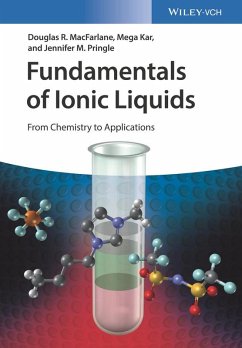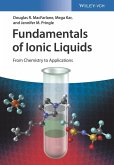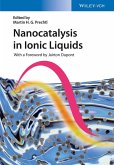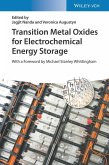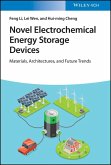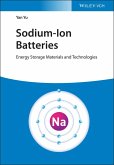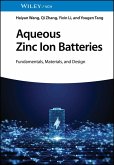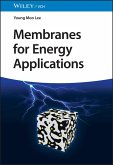Fundamentals of Ionic Liquids (eBook, PDF)
From Chemistry to Applications


Alle Infos zum eBook verschenken

Fundamentals of Ionic Liquids (eBook, PDF)
From Chemistry to Applications
- Format: PDF
- Merkliste
- Auf die Merkliste
- Bewerten Bewerten
- Teilen
- Produkt teilen
- Produkterinnerung
- Produkterinnerung

Hier können Sie sich einloggen

Bitte loggen Sie sich zunächst in Ihr Kundenkonto ein oder registrieren Sie sich bei bücher.de, um das eBook-Abo tolino select nutzen zu können.
Written by experts who have been part of this field since its beginnings in both research and academia, this textbook introduces readers to this evolving topic and the broad range of applications that are being explored. The book begins by examining what it is that defines ionic liquids and what sets them apart from other materials. Chapters describe the various types of ionic liquids and the different techniques used to synthesize them, as well as their properties and some of the methods used in their measurement. Further chapters delve into synthetic and electrochemical applications and…mehr
- Geräte: PC
- mit Kopierschutz
- eBook Hilfe
- Größe: 7.64MB
![Fundamentals of Ionic Liquids (eBook, ePUB) Fundamentals of Ionic Liquids (eBook, ePUB)]() Doug MacfarlaneFundamentals of Ionic Liquids (eBook, ePUB)88,99 €
Doug MacfarlaneFundamentals of Ionic Liquids (eBook, ePUB)88,99 €![Nanocatalysis in Ionic Liquids (eBook, PDF) Nanocatalysis in Ionic Liquids (eBook, PDF)]() Nanocatalysis in Ionic Liquids (eBook, PDF)142,99 €
Nanocatalysis in Ionic Liquids (eBook, PDF)142,99 €![Transition Metal Oxides for Electrochemical Energy Storage (eBook, PDF) Transition Metal Oxides for Electrochemical Energy Storage (eBook, PDF)]() Transition Metal Oxides for Electrochemical Energy Storage (eBook, PDF)162,99 €
Transition Metal Oxides for Electrochemical Energy Storage (eBook, PDF)162,99 €![Novel Electrochemical Energy Storage Devices (eBook, PDF) Novel Electrochemical Energy Storage Devices (eBook, PDF)]() Feng LiNovel Electrochemical Energy Storage Devices (eBook, PDF)133,99 €
Feng LiNovel Electrochemical Energy Storage Devices (eBook, PDF)133,99 €![Sodium-Ion Batteries (eBook, PDF) Sodium-Ion Batteries (eBook, PDF)]() Yan YuSodium-Ion Batteries (eBook, PDF)171,99 €
Yan YuSodium-Ion Batteries (eBook, PDF)171,99 €![Aqueous Zinc Ion Batteries (eBook, PDF) Aqueous Zinc Ion Batteries (eBook, PDF)]() Haiyan WangAqueous Zinc Ion Batteries (eBook, PDF)133,99 €
Haiyan WangAqueous Zinc Ion Batteries (eBook, PDF)133,99 €![Membranes for Energy Applications (eBook, PDF) Membranes for Energy Applications (eBook, PDF)]() Young Moo LeeMembranes for Energy Applications (eBook, PDF)142,99 €
Young Moo LeeMembranes for Energy Applications (eBook, PDF)142,99 €-
-
-
Dieser Download kann aus rechtlichen Gründen nur mit Rechnungsadresse in A, B, BG, CY, CZ, D, DK, EW, E, FIN, F, GR, HR, H, IRL, I, LT, L, LR, M, NL, PL, P, R, S, SLO, SK ausgeliefert werden.
- Produktdetails
- Verlag: Wiley-VCH
- Seitenzahl: 248
- Erscheinungstermin: 2. August 2017
- Englisch
- ISBN-13: 9783527340002
- Artikelnr.: 52557550
- Verlag: Wiley-VCH
- Seitenzahl: 248
- Erscheinungstermin: 2. August 2017
- Englisch
- ISBN-13: 9783527340002
- Artikelnr.: 52557550
- Herstellerkennzeichnung Die Herstellerinformationen sind derzeit nicht verfügbar.
Innovation Through New Materials
What Makes an Ionic Liquid, an "Ionic" Liquid?
What Can These Unique Materials Do - A Brief Overview
How Do We Go about Understanding Ionic Liquids?
STRUCTURE OF IONIC LIQUID FORMING IONS
Crystal Formation and How to Avoid It (Thermodynamics of Solids, Liquids and Melting)
Avoiding Efficient Packing of Ions - Bulky, Rigid and Low Symmetry Ions
Electrostatic Forces and How to Minimize Them (Shielding and Charge Delocalization)
Other Types of Ions (Metal-Based Ions, Polymeric Ions etc.)
Protic Ionic Liquids
Further Reading
STRUCTURE OF IONIC LIQUIDS
Introduction - Evidence for Structuring in Ionic Liquids at Various Length Scales; Ionicity
Experimental Probes of Structure
Simulation Approaches to Understanding Structure
Further Reading
SYNTHESIS OF IONIC LIQUIDS
Introduction
Approaches to Synthesis (Quaternisation/Alkylation, Metathesis, Anion Exchange, Proton Exchange, etc.)
Purification: Challenges and Methods (Halide Impurities, Proton Impurities, etc.; Re-Crystallization, Micro-Filtration, Anion-Exchange Resin, etc.)
Structure and Purity Analysis (NMR, MS, etc.)
Further Reading
PHYSICAL AND THERMAL PROPERTIES
Introduction - What Properties are Important?
Thermal Properties (Melting, Liquid crystal Formation, Decomposition)
Transport Properties and their Inter-Relationships (Viscosity, Conductivity, Diffusion, Walden Plot, etc.)
Properties of Ionic Liquid Mixtures
Further Reading
SOLVENT PROPERTIES AND SYNTHETIC APPLICATIONS OF IONIC LIQUIDS
Introduction - Solvency, Intermolecular Forces and Polarisability
Synthetic Chemistry in Ionic Liquids - Selected Examples
Liquid-Liquid Phase Equilibrium (Solvent Extraction/Separation, Water/Ionic Liquid Mixing and De-Mixing)
Biomass Dissolution and Processing (Cellulose, Keratin, etc.)
Gas Solubility and Applications (CO2, SO2, O2, etc.)
Further Reading
ELECTROCHEMISTRY OF, AND IN, IONIC LIQUIDS
Introduction
Cyclic Voltammetry (Reference Electrodes, Electrochemical Window, etc.)
Electro-Deposition of Metals
Electrosynthesis in Ionic Liquids
Further Reading
DEVICE APPLICATIONS
Introduction
Batteries (Li-Ion, Metal-Air, etc.)
Fuel Cells
Dye Sensitized Solar Cells
Supercapacitors
Actuators
Further Reading
BIOTECHNOLOGY APPLICATIONS
Biocompatible Ionic Liquids
Ionic Liquids from Active Pharmaceutical Ingredients
Biomolecule Stabilisation (Proteins, DNA, RNA)
Further Reading
CONCLUSIONS/FUTURE DIRECTIONS
APPENDIX
Glossary of Ions, Their Structure and Nomenclature (including acronyms)
Anions
Cations
Innovation Through New Materials
What Makes an Ionic Liquid, an "Ionic" Liquid?
What Can These Unique Materials Do - A Brief Overview
How Do We Go about Understanding Ionic Liquids?
STRUCTURE OF IONIC LIQUID FORMING IONS
Crystal Formation and How to Avoid It (Thermodynamics of Solids, Liquids and Melting)
Avoiding Efficient Packing of Ions - Bulky, Rigid and Low Symmetry Ions
Electrostatic Forces and How to Minimize Them (Shielding and Charge Delocalization)
Other Types of Ions (Metal-Based Ions, Polymeric Ions etc.)
Protic Ionic Liquids
Further Reading
STRUCTURE OF IONIC LIQUIDS
Introduction - Evidence for Structuring in Ionic Liquids at Various Length Scales; Ionicity
Experimental Probes of Structure
Simulation Approaches to Understanding Structure
Further Reading
SYNTHESIS OF IONIC LIQUIDS
Introduction
Approaches to Synthesis (Quaternisation/Alkylation, Metathesis, Anion Exchange, Proton Exchange, etc.)
Purification: Challenges and Methods (Halide Impurities, Proton Impurities, etc.; Re-Crystallization, Micro-Filtration, Anion-Exchange Resin, etc.)
Structure and Purity Analysis (NMR, MS, etc.)
Further Reading
PHYSICAL AND THERMAL PROPERTIES
Introduction - What Properties are Important?
Thermal Properties (Melting, Liquid crystal Formation, Decomposition)
Transport Properties and their Inter-Relationships (Viscosity, Conductivity, Diffusion, Walden Plot, etc.)
Properties of Ionic Liquid Mixtures
Further Reading
SOLVENT PROPERTIES AND SYNTHETIC APPLICATIONS OF IONIC LIQUIDS
Introduction - Solvency, Intermolecular Forces and Polarisability
Synthetic Chemistry in Ionic Liquids - Selected Examples
Liquid-Liquid Phase Equilibrium (Solvent Extraction/Separation, Water/Ionic Liquid Mixing and De-Mixing)
Biomass Dissolution and Processing (Cellulose, Keratin, etc.)
Gas Solubility and Applications (CO2, SO2, O2, etc.)
Further Reading
ELECTROCHEMISTRY OF, AND IN, IONIC LIQUIDS
Introduction
Cyclic Voltammetry (Reference Electrodes, Electrochemical Window, etc.)
Electro-Deposition of Metals
Electrosynthesis in Ionic Liquids
Further Reading
DEVICE APPLICATIONS
Introduction
Batteries (Li-Ion, Metal-Air, etc.)
Fuel Cells
Dye Sensitized Solar Cells
Supercapacitors
Actuators
Further Reading
BIOTECHNOLOGY APPLICATIONS
Biocompatible Ionic Liquids
Ionic Liquids from Active Pharmaceutical Ingredients
Biomolecule Stabilisation (Proteins, DNA, RNA)
Further Reading
CONCLUSIONS/FUTURE DIRECTIONS
APPENDIX
Glossary of Ions, Their Structure and Nomenclature (including acronyms)
Anions
Cations
